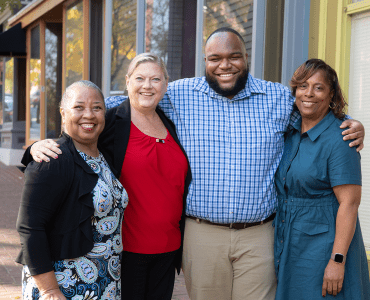Jennifer Gass’ grandmother had a medical problem, but she also had a solution. Jennifer would become a doctor and care for her. There was one problem: Jennifer was 12 at the time. “It was a little shortsighted,” Gass recalls now, laughing at the memory.
It also showed a lot of forethought. Gass (pronounced G-ahh-s) did become a physician, and today thousands of women have benefited from her pioneering work as chief of surgery at Women & Infants Hospital of Rhode Island and director of the Breast Health Center there at Brown University. “I typically do 200 to 250 breast cancer surgeries a year,” says Gass, MD, FACS, who went to Brown in 1994.
She credits the firm foundation she received at the University of Maryland School of Medicine (UMSOM) for her growth as a surgeon and researcher. Gass recalls the school’s chief of surgery at the time, Harlan Stone, MD, used an analogy to simplify the language of surgery.
“He told us surgery was like the highway system, that odd highways and interstates go north and south, even highways go east and west, and three-digit highways often go around a city,” Gass recalls. “He was inspiring.”
The 1987 alumna developed research skills in the lab of neurologist Paul Fishman, MD, PhD, working on his coronavirus model for Parkinson’s disease. “He published an article and let me be a minor co-author in the premier journal Science, so that was another great steppingstone,” Gass says. “He was a terrific mentor.”
Raised in “really white middle-class” Montgomery County by a hardworking single mother who pushed her to excel, Gass found the diversity of Baltimore enlightening. “You can’t just read about it in a book, you really have to bear witness to the sickle cell patient in crisis, or the alcoholic with pancreatitis who wants to, but can’t stay alcohol-free,” she says. “Baltimore gave me a greater perspective.”
Gass so appreciates her UMSOM education that she has supported its Medical Alumni Association financially. “The medical school has done a good job admitting more women into medical school. Now the next hurdle is diversity, and I’m happy to support that critically important initiative,” she says.
Breaking new ground is something Gass knows firsthand. In 2019, she became the first woman to rise to full professor of surgery on the teacher-scholar track at Brown. “I am pretty proud of that,” says Gass, professor of surgery and obstetrics/gynecology. “It’s hard to be a physician, a mother, a spouse, and do the work it takes to move up that ladder. Even now my goal is to help junior faculty dismantle these barriers.”
For Gass, watching her cancer patients reach milestones is most rewarding. “To hear about them becoming mothers or attending their children’s weddings, seeing their grandchildren — things they feared might never happen when diagnosed with cancer. That gives me incredible satisfaction,” she says.
It happens often. Gass points out the five-year survival rate for patients with Stage 1 breast cancer is now 99.6 percent nationally. She’s proud that her research contributed to enhanced survivorship outcomes.
In 2005, she was the first physician in Rhode Island to perform cryoablation (using extreme cold) to eliminate benign tumors of the breast, a treatment strategy now used for small breast cancers. In 2011, a one-month sabbatical in Paris enhanced her oncoplastic surgery skills, which combine the best techniques of plastic and oncologic surgery to remove breast cancer without postoperative deformity.
Breast-specific sensuality research, which Gass calls “my little niche,” found that women felt “more whole” after lumpectomy and radiation than women treated with mastectomy, “even if we had been able to preserve the entirety of the skin and nipple and performed an immediate breast reconstruction.”
Away from the office, Gass strives to maintain fitness with yoga and her trusty Peloton cycle. She also enjoys international travel and cooking with family. She and her husband, a cardiac surgeon, have a blended family of five adult children and three grandchildren. No. 1 on her bucket list is to volunteer at Tenwek Hospital in Kenya where her husband annually performs lifesaving heart valve repair.
As Gass gets older, the teaching component of her job takes on added relevance. “I can take care of one patient at a time, but if I train two fellows every year, that’s two more doctors out there delivering the best breast cancer care. So that gives me joy,” she says.




